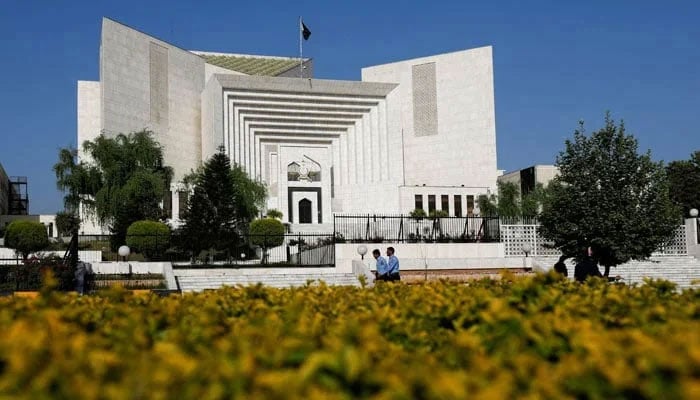SC asks if Noor Mukadam’s unnatural death being made controversial
Salman Safdar presented to court Zahir’s medical history dating back to 2013
ISLAMABAD: The Supreme Court (SC) was informed on Monday that the trial court in Noor Mukadam murder case failed to assess properly the mental condition of Zahir Jaffer at the time of committing crime.
A three-member SC bench, headed by Justice Muhammad Hashim Khan Kakar, heard the appeal of Zahir Jaffer, who was convicted twice with death sentences in the high-profile Noor Mukadam murder case.
During the hearing, Salman Safdar, counsel for the appellant, argued before the court that Zahir was mentally unstable at the time of the crime and that the trial court had failed to properly assess his mental condition.
The court questioned whether the defence was trying to make an unnatural death controversial, noting that a young girl was brutally murdered and both parties usually know the full facts, adding that it’s the trial judges who decide.
Salman Safdar presented to court Zahir’s medical history dating back to 2013, arguing that he was sentenced to death for murder, life imprisonment for rape, and 10 years for abduction. He noted the Islamabad High Court had increased the rape sentence to death, criticising the trial court for not explaining why it awarded a lesser sentence.
He argued the initial FIR was only for murder, and charges of abduction and rape were added 22 days later. The counsel claimed the crime scene, Zahir’s home, had not presented evidence and that the post-mortem showed Noor died at 12:10am, with the murder FIR filed at 11:30pm.
He also pointed out that Amjad, an injured person at the scene, was made an accused instead of a witness, adding that the case relied heavily on CCTV footage and included a photogrammetric test of the accused.
Referencing the controversial video scandal involving late judge Arshad Malik, the counsel also brought up a recent PTI-related case involving similar video evidence. Justice Hashim Kakar remarked that even statements made in the Kaaba would be hard to prove under such evidentiary standards.
Salman Safdar further submitted that the murder weapon — a small knife — lacked the accused’s fingerprints, and that all witnesses besides Noor’s father were state witnesses. Justice Kakar noted that there was no eyewitness and all evidence was circumstantial. He warned that relief would only be granted if justified.
Justice Kakar added that Noor was murdered in the presence of 6 to 7 people, and that Therapy Clinic’s staff were made accused for hiding facts. Meanwhile, after the court resumed hearing after interval, Salman Safdar reiterated his client’s mental instability and faults in the medical examination. Justice Kakar responded that such objections should’ve been raised earlier.
Salman Safdar submitted that the entire case was based on CCTV and DVR footage and criticised the post-mortem for omitting wound size details. Later, the court adjourned the matter for Tuesday (today).
-
 Jessica Alba, Cash Warren Finalize Divorce After 16 Years Of Marriage
Jessica Alba, Cash Warren Finalize Divorce After 16 Years Of Marriage -
 China’s AI Boom Takes Center Stage At Spring Festival One Year After DeepSeek Stirred The Industry
China’s AI Boom Takes Center Stage At Spring Festival One Year After DeepSeek Stirred The Industry -
 James Van Der Beek Called His Sixth Child Jeremiah 'healing For Us' Before His Death
James Van Der Beek Called His Sixth Child Jeremiah 'healing For Us' Before His Death -
 Elon Musk Vs Reid Hoffman: Epstein Files Fuel Public Spat Between Tech Billionaires
Elon Musk Vs Reid Hoffman: Epstein Files Fuel Public Spat Between Tech Billionaires -
 Gordon Ramsay Denies Victoria Beckham Got Handsy With Brooklyn At His Wedding
Gordon Ramsay Denies Victoria Beckham Got Handsy With Brooklyn At His Wedding -
 Gordon Ramsay Makes Unexpected Plea To Brooklyn As He Addresses Beckham Family Feud
Gordon Ramsay Makes Unexpected Plea To Brooklyn As He Addresses Beckham Family Feud -
 Prince Harry Warns Meghan Markle To 'step Back'
Prince Harry Warns Meghan Markle To 'step Back' -
 Selena Gomez Explains Why She Thought Lupus Was 'life-or-death'
Selena Gomez Explains Why She Thought Lupus Was 'life-or-death' -
 New Zealand Flood Crisis: State Of Emergency Declared As North Island Braces For More Storms
New Zealand Flood Crisis: State Of Emergency Declared As North Island Braces For More Storms -
 Nancy Guthrie Case: Mystery Deepens As Unknown DNA Found At Property
Nancy Guthrie Case: Mystery Deepens As Unknown DNA Found At Property -
 James Van Der Beek's Brother Breaks Silence On Actor's Tragic Death
James Van Der Beek's Brother Breaks Silence On Actor's Tragic Death -
 Megan Thee Stallion On New Romance With Klay Thompson: 'I'm Comfy'
Megan Thee Stallion On New Romance With Klay Thompson: 'I'm Comfy' -
 Nicole Kidman Celebrates Galentine’s Day Months After Keith Urban Split
Nicole Kidman Celebrates Galentine’s Day Months After Keith Urban Split -
 Justin Bieber Unveils Hailey Bieber As First Face Of SKYLRK In Intimate Campaign Debut
Justin Bieber Unveils Hailey Bieber As First Face Of SKYLRK In Intimate Campaign Debut -
 Caitlin O’Connor Says Fiance Joe Manganiello Has Changed Valentine’s Day For Her
Caitlin O’Connor Says Fiance Joe Manganiello Has Changed Valentine’s Day For Her -
 Rachel Zoe Sends Out Message For Womne With Her Post-divorce Diamond Ring
Rachel Zoe Sends Out Message For Womne With Her Post-divorce Diamond Ring




